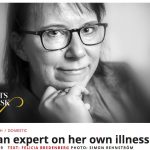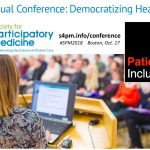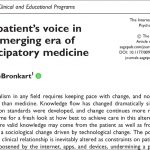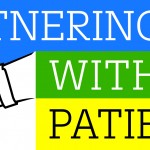
by e-Patient Dave | Jan 31, 2019
Sara RIggare, one of the earliest members of our Society, has just received a great honor: Fokus magazine (“Sweden’s Time”) has named her “Swede of the Year” in medicine. In the photo from the award ceremony she seems appropriately...

by e-Patient Dave | Dec 5, 2018
In Chicago, SPM members have been getting together for regular meetups. It’s been fun and exciting, and lots of us think it would be great to offer the idea to other areas. Here’s how we started and how we do it – take it on and make it your own! This time...

by e-Patient Dave | Dec 4, 2018
Our Society for Participatory Medicine is growing in membership and in projects and teams. If you’re a member, have you considered leading a team? If you’re not, have you considered joining? The message below was posted last weekend by co-founder and...

by e-Patient Dave | Nov 2, 2018
Lifetime SPM member Deborah Greenwood is a diabetes educator who has long believed in patient empowerment and participatory medicine. SPM welcomes posts authored by our members – see the guidelines. November is Diabetes Awareness Month. And November 14, 2018 is...

by Sue Woods | Oct 29, 2018
On October 17th, the Society enjoyed their 2nd conference in Boston. Filling a larger room than last year, attendees – in person and virtual – enjoyed an impressive lineup of speakers. The passion in the room was palpable. Much more to come on that. A...

by Casey Quinlan | Oct 20, 2018
This will be the third, and last, in my short series on attending the Cochrane Colloquium in Edinburgh in September of this year. In the first post, I talked about what that conference was like; in the second, I shared an overview of Cochrane as a global movement to...

by Casey Quinlan | Oct 13, 2018
If you’ve been paying attention, you know that yours truly got the chance to attend the annual Cochrane Colloquium in Edinburgh in September this year, thanks to a travel stipend from SPM, a #PatientsIncluded bursary from Cochrane UK, the hosts of the 2018...

by e-Patient Dave | Oct 3, 2018
Here’s the latest in a series of posts about the Society for Participatory Medicine’s second annual conference on Oct. 17 in Boston, attached to the prestigious Connected Health conference. Register here. (Our #SPM2018 series has more about the speakers and...

by John Novack | Sep 24, 2018
Here’s the latest in a series of interviews with outstanding speakers we’ve lined up for the Society for Participatory Medicine’s second annual conference on Oct. 17 in Boston. Register here. And see this blog’s #SPM2018 series for more about, or by, the speakers and...

by e-Patient Dave | Sep 17, 2018
For updates, follow Casey’s tweets on the #CochraneForAll hashtag – tweets by her and tweets tagging her. Casey will be a speaker at #SPM2018 on Oct 17, in a session with Ivan Handler of the Insightamation blog – “Thoughts and provocations on...

by John Novack | Sep 7, 2018
The Society for Participatory Medicine advocates for transforming the culture of care, so we watch for signs that the culture is changing. A newly released peer-reviewed article hints at progress: formally introducing patient perspectives into not just the practice of...

by e-Patient Dave | Jul 15, 2018
TONIGHT: 9 pm Eastern time. #BCSM Twitter chat on the latest Facebook privacy issue. This time the data leaked is from a patient group. FB says it’s a nothingburger. What do you think? Facebook has a record of privacy leaks. The poster shown here (click to...

by e-Patient Dave | Jun 27, 2018
This is the first of two posts about this important policy issue regarding portability of our medical records. The second is by Michael Millenson, who did the lion’s share of this work, as noted below. Our Society’s Advocacy and Policy chair Vera Rulon...

by Sarah Krüg | May 23, 2018
We are in the midst of a loneliness epidemic that affects millions, whether you’re married, single or somewhere in between, young or old, an urban dweller or live in a remote village. Loneliness lurks in our shadows, yet unlike smoking or obesity isn’t socially...

by e-Patient Dave | May 14, 2018
As regular readers know, this blog has long been friends with The BMJ (formerly the British Medical Journal), especially because of its world-leading Patient Partnership campaign including the Patient Advisory Panel, which includes several SPM members and has an...

by e-Patient Dave | May 14, 2018
Posted today on our SPM Connect member forum by SPM vice-chair Joe Ternullo Join me in cheering on SPM members Lorraine and Gene Sacco, founders of the Reid R. Sacco Adolescent & Young Adult Cancer Alliance. (@AYACancerAllian) The Chronicle Episode “Beyond...

by e-Patient Dave | Apr 18, 2018
Our Society for Participatory Medicine’s presence and impact in the world is escalating this year, thanks to many factors. A big one is the addition of activist board members like Burt Rosen of member company HealthSparq, and another is that our time has come. A...

by e-Patient Dave | Mar 20, 2018
An important post from long-time SPM member (and former board member) Jane Sarasohn-Kahn (@HealthyThinker), cross-posted from her widely read Health Populi site. (The screen capture above is from this BBC article, which came out hours after Jane’s post below.)...

by e-Patient Dave | Jan 25, 2018
The health IT sphere is abuzz with Apple’s groundbreaking announcement yesterday of the new ability, in the beta version of iOS 11.3, to download lab results, allergies, “problem lists,” etc. from multiple hospitals. So far twelve hospitals have...

by Sarah Krüg | Jan 4, 2018
Language has a magical influence on the lives we lead, with an impact on our thoughts, emotions, and/or actions. The words we use are one of the most potent ingredients in the science of language. Words have the power to heal, guide and motivate. They can confuse,...



























Recent Comments